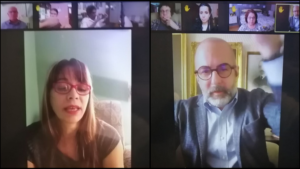OPOSITORES CUBANOS EN LA ISLA SE UNEN PARA TRABAJAR POR LA TRANSICION A LA DEMOCRACIA.
OPOSITORES, activistas y periodistas independientes presentaron este lunes el ‘Consejo para la Transición Democrática en Cuba’, una iniciativa que pretende alcanzar tres aspiraciones fundacionales: “una nación con todos, una sociedad inclusiva y una república de derechos”.
El Consejo, integrado por más de 30 opositores, es al mismo tiempo una plataforma política, un centro de ideas y un embrión de Gobierno, con presencia en la Isla y en cualquier lugar del mundo donde haya cubanos, según informaron sus organizadores en rueda de prensa.
Enix Berrios, del Partido Demócrata Cristiano de Cuba y uno de los vicepresidentes, explicó que la primera tarea es proponer, evaluar y criticar la política del régimen cubano. Ante la pregunta de 14ymedio de si existe la intención de propiciar un diálogo con la dictadura, precisó: “Hoy estamos naciendo sin la intención de vernos sentados a una mesa con el régimen, lo estamos cuestionando y lo consideramos ilegítimo. Con el transcurso del tiempo vamos a ver qué va a pasar. Hoy no estamos abiertos al diálogo”.
“Hoy estamos naciendo sin la intención de vernos sentados a una mesa con el régimen, lo estamos cuestionando y lo consideramos ilegítimo”
A pesar de las dificultades técnicas, que impidieron la presencia de varios miembros en la presentación, primó la diversidad en la composición del Consejo, que “no pretende la representación de todos, pero está abierto a la participación de los actores sociales, culturales y políticos, que quieran colocar dentro de una misma cesta de iniciativas un conjunto de acciones, de propuestas y de ideas concertadas de cambio democrático”.
El asesor de la Secretaría de Relaciones Exteriores del Consejo, Ernesto Gutiérrez Tamargo, precisó que la iniciativa es un ente abierto que pretende que todos formen parte de sus estructuras.
Gutiérrez explicó que “hay un organigrama jerárquico porque alguien tiene que hacerse cargo de la organización”. Las primeras personas que integran la lista están allí por “el mérito, la experiencia, el tiempo de trabajo y la capacidad de volcarse en la lucha por la libertad, la democracia y los derechos humanos en Cuba”. Añadió que se ha hablado con muchas personas más y que algunas han optado por “mantenerse en un segundo lugar”.
En opinión de Gutierrez Tamargo, la reciente resolución del Parlamento Europeo sobre los derechos humanos y la situación política en Cuba “dio legitimidad a la oposición cubana” para servir de interlocutora con organizaciones e incluso Gobiernos de otros países.
El Consejo para la Transición Democrática lo preside José Daniel Ferrer (Unión Patriótica de Cuba) y entre los nueve vicepresidentes se encuentran Manuel Cuesta (Arco Progresista/Cuba En Plural) y Félix Navarro (Partido por la Democracia Pedro Luis Boitel).
CUBAN OPPOSITORS ON THE ISLAND JOIN TO WORK FOR THE TRANSITION TO DEMOCRACY.
OPPOSITORS, activists, and independent journalists presented this Monday the ‘Council for the Democratic Transition in Cuba’, an initiative that aims to achieve three foundational aspirations: “a nation with all, an inclusive society and a republic of rights.”
The Council, made up of more than 30 opponents, is at the same time a political platform, a center of ideas and a government embryo, with a presence on the island and anywhere in the world where there are Cubans, according to its organizers in a round of press.
Enix Berrios, from the Christian Democratic Party of Cuba and one of the vice presidents, explained that the first task is to propose, evaluate and criticize the policy of the Cuban regime. When asked by 14ymedio whether there is an intention to promote a dialogue with the dictatorship, he specified: “Today we are born without the intention of seeing ourselves sitting at a table with the regime, we are questioning it and we consider it illegitimate. Over time let’s see what will happen. Today we are not open to dialogue. ”
“Today we are being born without the intention of seeing ourselves sitting at a table with the regime, we are questioning it and we consider it illegitimate”
Despite the technical difficulties, which prevented the presence of several members in the presentation, diversity prevailed in the composition of the Council, which “does not pretend to represent everyone but is open to the participation of social, cultural and political actors. , who want to place within the same basket of initiatives a set of actions, proposals and concerted ideas for democratic change “.
The adviser to the Council’s Foreign Relations Secretariat, Ernesto Gutiérrez Tamargo, specified that the initiative is an open entity that wants everyone to be part of its structures.
Gutiérrez explained that “there is a hierarchical organization because someone has to take charge of the organization.” The first people to make the list are there for “merit, experience, work time, and the ability to devote themselves to the fight for freedom, democracy and human rights in Cuba.” He added that many more people have been spoken to and that some have chosen to “stay second.”
In Gutierrez Tamargo’s opinion, the recent European Parliament resolution on human rights and the political situation in Cuba “gave the Cuban opposition legitimacy” to serve as an interlocutor with organizations and even governments of other countries.
The Council for the Democratic Transition is chaired by José Daniel Ferrer (Patriotic Union of Cuba) and among the nine vice presidents are Manuel Cuesta (Progressive Arch / Cuba En Plural) and Félix Navarro (Pedro Luis Boitel Democracy Party).
Agencies/ En Cuba, Prensa Independiente,La Habana/ Internet Photos/ Arnoldo Varona/ Videos/Photos>La Historia de Cuba
THE CUBAN HISTORY, HOLLYWOOD.









